Filter by
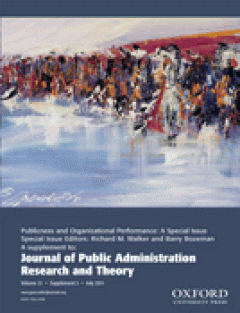
Dimensions of Publicness and Organizational Performance : A Review of the Evi…
Debates about the merits of publicness have dominated the public administration landscape since the foundation of the modern state. The extent of organizational publicness (ownership, funding, and control) has waxed and waned in developed countries: it rose following the postwar settlement and fell under the policies of New Right government and the popularity of the notions of New Public Manage…
- Edition
- Vol. 21, Supplement 3, July 2011.pp. i301-i319
- ISBN/ISSN
- 10531858
- Collation
- -
- Series Title
- Journal of Public Administration Research and Theory
- Call Number
- -

Sampling Designs for Analyzing Publicness : Alternatives and Their Strengths …
Research comparing public and private organizations and otherwise analyzing �publicness� involves complex challenges. These include the challenge of designing and attaining adequate samples to represent the two complex categories of �public� and �private,� as well as dimensions of publicness, and subcategories and control variables needed for valid comparisons. This review of sampling alternati…
- Edition
- Vol. 21, Supplement 3, July 2011,pp. i321-i345
- ISBN/ISSN
- 10531858
- Collation
- -
- Series Title
- Journal of Public Administration Research and Theory
- Call Number
- -

Parsing Public/Private Differences in Work Motivation and Performance : An Ex…
This article echoes recent calls for public management research to focus on core questions and utilize multiple methods to advance the state of knowledge in the field. In this article, we call for more experimental research on the public/private distinction, which is a core public management research topic. We then conduct a pilot experimental study that provides new insights�and what seem to b…
- Edition
- Vol. 21, Suppl. 3, July 2011,pp. i347-i362
- ISBN/ISSN
- 10531858
- Collation
- -
- Series Title
- Journal of Public Administration Research and Theory
- Call Number
- -

Integrative Publicness : A Framework for Public Management Strategy and Perfo…
�Empirical publicness� explains organizations on the basis of their mix of political and economic authority, whereas �normative publicness� seeks to identify, prescribe or infuse public values. The scholarly traditions developed by these two types of publicness have tended not to overlap and for very good reason�blending empirical and normative theory and purpose is a problem of longstanding, o…
- Edition
- Vol. 21, Suppl 3, July 2011,pp. i363-i380
- ISBN/ISSN
- 10531858
- Collation
- -
- Series Title
- Journal of Public Administration Research and Theory
- Call Number
- -
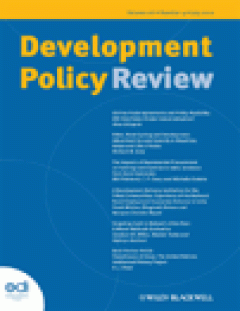
Promoting Children's Well-being : Policy Lessons from Past and Present Econom…
This article reviews evidence from historical crisis episodes from four geographical regions to identify patterns in how economic crises shape dimensions of child wellbeing. The analysis is motivated by a concern to identify possible policy lessons of relevance to the 2007- financial crisis and its impacts on children and their caregivers. We conclude that while broad counter-cyclical economic …
- Edition
- Volume 29, Issue 5, September 2011, pages 621–641
- ISBN/ISSN
- 09506764
- Collation
- -
- Series Title
- Development Policy Review Special Issue: Impacts of Economic Crises on Child Well-being
- Call Number
- -
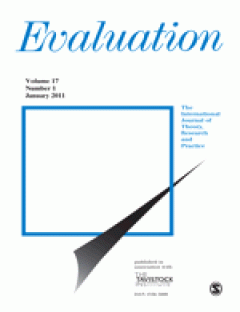
Bridging the gap between planning evaluation and programme evaluation : The c…
Despite the potential advantages of a closer link between planning evaluation and programme evaluation , both fields have been developed independently. This is mainly due to significant differences between them, particularly in terms of historical background, evaluation scope and contexts, the articulation between theory and practice, and the timings of evaluation. This article advocates bridgi…
- Edition
- Vol. 17 no. 3, July 2011.pp. 293-307
- ISBN/ISSN
- 13563890
- Collation
- -
- Series Title
- Evaluation
- Call Number
- -
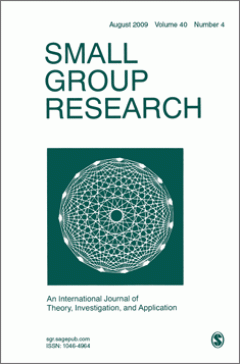
Methodological Issues in Measuring Group Learning
This article examines current empirical approaches to group learning. It focuses on two central questions: Are these approaches really measuring group learning, and what critical issues should be resolved in future group-learning research? The rationale for this examination is threefold. First, the last 10 years have seen a substantial increase in research on group learning. As this literature …
- Edition
- Vol. 42 no. 4, August 2011.pp. 379-404
- ISBN/ISSN
- 10464964
- Collation
- -
- Series Title
- Small Group Research
- Call Number
- -

Review of Virtual Environment Studies on Social and Group Phenomena
This article provides a review of previously published studies on virtual environments (VEs), focusing especially on empirical articles on social and group phenomena in VEs and their methodological and theoretical trends. VEs can be defined as communication systems in which interactants share the same three-dimensional digital space and can navigate, manipulate objects, and interact with one an…
- Edition
- Vol. 42 no. 4, August 2011.pp. 405-457
- ISBN/ISSN
- 10464964
- Collation
- -
- Series Title
- Small Group Research
- Call Number
- -

Does Backing Up Behavior Explain the Efficacy—Performance Relationship in T…
Although the relationship between collective efficacy beliefs and team performance has been well-documented, few studies have explored the causal mechanisms that might explain these effects. In the current study, the authors explore the role of backing up behavior, a specific form of teamwork behavior, in explaining why high efficacy beliefs lead to high levels of team performance. Participants…
- Edition
- Vol. 42 no. 4, August 2011.pp. 458-474
- ISBN/ISSN
- 10464964
- Collation
- -
- Series Title
- Small Group Research
- Call Number
- -

Effects of Anonymity and Social Comparison of Rewards on Computer-Mediated Gr…
Anonymity in computer-mediated communication (CMC) is valued in organizations because it can facilitate participation in discussions, especially of sensitive issues. Concerns over maintaining the motivation to participate in such discussions, because of the inability to reward people for their contributions, have led to the development of techniques that allow rewards to be allocated without id…
- Edition
- Vol. 42 no. 4, August 2011,pp. 475-503
- ISBN/ISSN
- 10464964
- Collation
- -
- Series Title
- Small Group Research
- Call Number
- -

An Institutional Theory of Direct and Indirect Rule
Most governance arrangements involve spatial units with highly unequal powers, for example, a feudal monarchy and its principalities, an empire and its colonies, a formal empire and an informal empire (or sphere of influence), a national government and its subnational entities, or a regional government and its local entities. In this situation, the dominant unit (A) usually enjoys some discreti…
- Edition
- Vol. 63, Number 3, July 2011,pp. 377-433
- ISBN/ISSN
- 00438871
- Collation
- -
- Series Title
- World Politics
- Call Number
- -

Embedded Mobilization : Nonstate Service Provision as Electoral Strategy in I…
How do elite parties win over poor voters while maintaining their core constituencies? How can religious parties expand their electoral base? This article argues that social service provision constitutes an important electoral strategy for elite-backed religious parties to succeed in developing democracies. The study demonstrates how the upper caste, Hindu nationalist Bharatiya Janata Party (BJ…
- Edition
- Vol. 63, Number 3, July 2011,pp. 434-469
- ISBN/ISSN
- 00438871
- Collation
- -
- Series Title
- World Politics
- Call Number
- -

The Rise of Indirect Affirmative Action : Converging Strategies for Promoting…
A growing trend in the comparative politics literature on patterns of minority incorporation emphasizes the emerging policy convergence in this area, conventional oppositions between national models notwithstanding. This convergence is further illustrated by drawing upon the cases of two countries often analyzed within an �exceptionalist� framework and generally viewed as polar opposites as far…
- Edition
- Vol. 63, Number 3, July 2011,pp. 470-508
- ISBN/ISSN
- 00438871
- Collation
- -
- Series Title
- World Politics
- Call Number
- -

Globalization, Party Positions, and the Median Voter
The authors argue that the effects of economic globalization on social democratic parties in Western Europe are conditional on the position of the median voter. If the median is far enough to the right, such parties will adopt business-friendly policies because they are required to win office. Only when the median is relatively far to the left will globalization constrain social democratic part…
- Edition
- Vol. 63, Number 3,July 2011,pp. 509-547
- ISBN/ISSN
- 00438871
- Collation
- -
- Series Title
- World Politics
- Call Number
- -

International Relations Theory and the Rise of European Foreign and Security …
The historical rise of European foreign, security, and defense policy marks an important development in European politics and world politics more broadly. Long thought unlikely to amount to much, European integration in the domains of traditional �high politics� has consolidated bit by bit since the mid-1990s, under the auspices of a common foreign and security policy (CFSP) and a pan-European …
- Edition
- Vol. 63 Number 3, July 2011,pp. 548-579
- ISBN/ISSN
- 00438871
- Collation
- -
- Series Title
- World Politics
- Call Number
- -
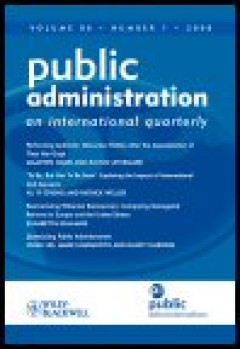
INTRODUCTION : ADMINISTRATIVE REFORM IN GREECE, ITALY, PORTUGAL AND SPAIN
This symposium presents an overview of the state and administrative reforms in Southern Europe. The papers are written by scholars who are not only celebrated in their field, but also native to the country they write about. The report on Greece is by Dimitri A. Sotiropoulos and Calliope Spanou of Athens University. Edoardo Ongaro of Bocconi University Milan reports on Italy. In the case of Port…
- Edition
- Volume 89, Issue 3, September 2011, pp.721–722
- ISBN/ISSN
- 00333298
- Collation
- -
- Series Title
- Public Administration
- Call Number
- -

THE ODYSSEY OF ADMINISTRATIVE REFORMS IN GREECE, 1981–2009 : A TALE OF TWO …
In Greece, two distinct reform paths led to institutional building and economic managerial types of reform. These two reforms, with the exception of the period 1996�2004, when both institutional and economic reforms were attempted, did not attract the same degree of attention. Institutional reforms were more successful than attempts at managerial reforms; reform implementation on the other hand…
- Edition
- Volume 89, Issue 3, September 2011, pages 723–737
- ISBN/ISSN
- 00333298
- Collation
- -
- Series Title
- Public Administration
- Call Number
- -

THE ROLE OF POLITICS AND INSTITUTIONS IN THE ITALIAN ADMINISTRATIVE REFORM TR…
This article applies broad conceptual categories of comparative politics to the explanation of administrative reforms in Italy. It takes as its argument some lines of influence on public sector reform of the features of the party system in Italy, the executive-legislative balance, the politician-bureaucrat relationship, and the role of administrative law. In the search for explanations for the …
- Edition
- Volume 89, Issue 3, September 2011, pages 738–755
- ISBN/ISSN
- 00333298
- Collation
- -
- Series Title
- Public Administration
- Call Number
- -

THE DIFFICULT TRANSFORMATION OF STATE AND PUBLIC ADMINISTRATION IN PORTUGAL. …
Portugal has been characterized by a late discontinuous democratization process. This contribution discusses the case of state and public administration reform in Portugal by using approaches from democratization, modernization and Europeanization theories. In order to understand the Portuguese case, the concept of �neo-patrimonialism� is used. We characterize Portuguese public administration a…
- Edition
- Volume 89, Issue 3, September 2011, pages 756–782
- ISBN/ISSN
- 00333298
- Collation
- -
- Series Title
- Public Administration
- Call Number
- -

ADMINISTRATIVE TRADITION AND REFORMS IN SPAIN : ADAPTATION VERSUS INNOVATION
The main purpose of this paper is understanding public administration formation and change in Spain. Its development before and since the years of Franco from 1939 to 1975, is noticeably path dependent in nature. As this paper will show, the foundations were laid before the Franco regime. Then came a period of political domination of the bureaucracy and the emergence of a key structural element…
- Edition
- Volume 89, Issue 3, September 2011, pages 783–800
- ISBN/ISSN
- 00333298
- Collation
- -
- Series Title
- Public Administration
- Call Number
- -
 Computer Science, Information & General Works
Computer Science, Information & General Works  Philosophy & Psychology
Philosophy & Psychology  Religion
Religion  Social Sciences
Social Sciences  Language
Language  Pure Science
Pure Science  Applied Sciences
Applied Sciences  Art & Recreation
Art & Recreation  Literature
Literature  History & Geography
History & Geography